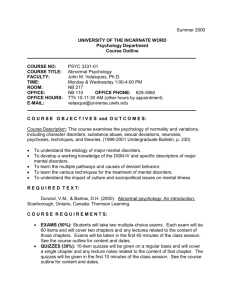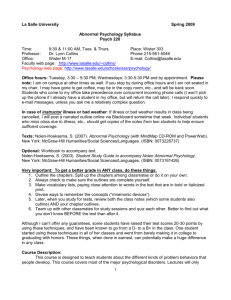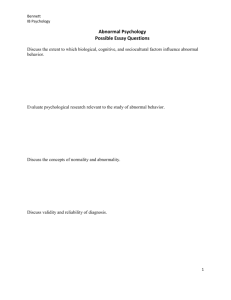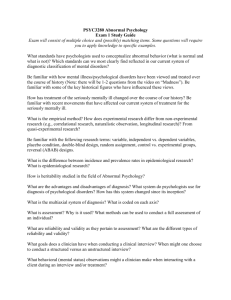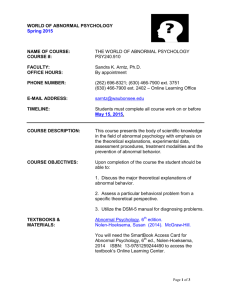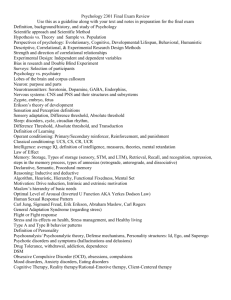Psych 425 Abnormal Psych T/T 220-345
advertisement
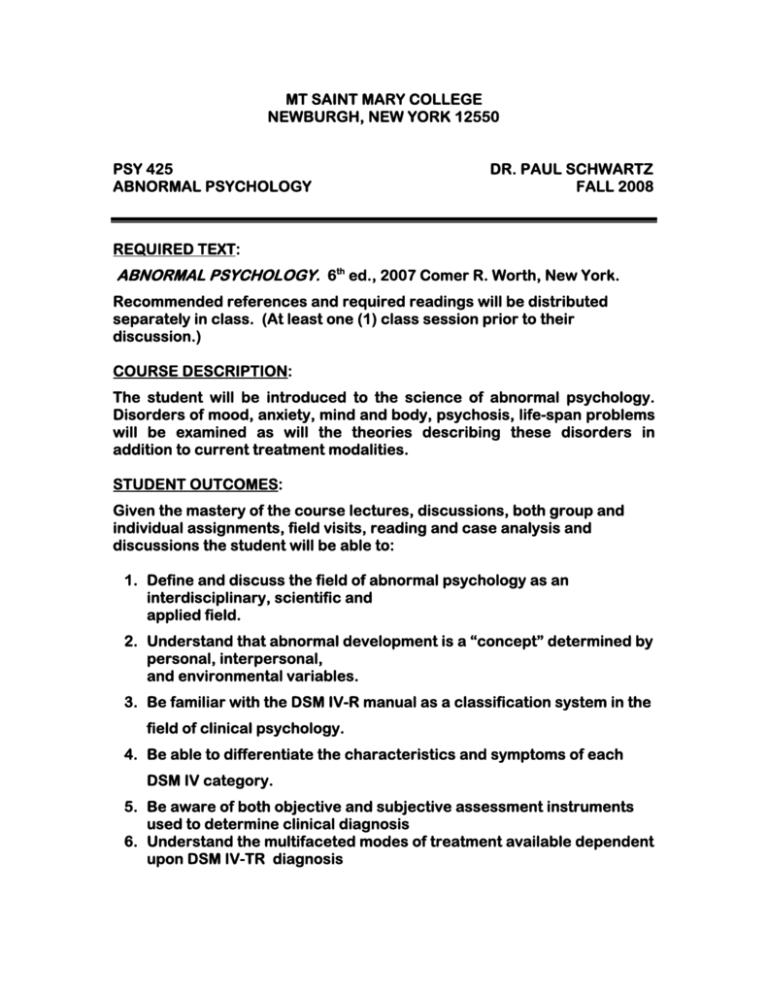
MT SAINT MARY COLLEGE NEWBURGH, NEW YORK 12550 PSY 425 ABNORMAL PSYCHOLOGY DR. PAUL SCHWARTZ FALL 2008 REQUIRED TEXT: ABNORMAL PSYCHOLOGY. 6th ed., 2007 Comer R. Worth, New York. Recommended references and required readings will be distributed separately in class. (At least one (1) class session prior to their discussion.) COURSE DESCRIPTION: The student will be introduced to the science of abnormal psychology. Disorders of mood, anxiety, mind and body, psychosis, life-span problems will be examined as will the theories describing these disorders in addition to current treatment modalities. STUDENT OUTCOMES: Given the mastery of the course lectures, discussions, both group and individual assignments, field visits, reading and case analysis and discussions the student will be able to: 1. Define and discuss the field of abnormal psychology as an interdisciplinary, scientific and applied field. 2. Understand that abnormal development is a “concept” determined by personal, interpersonal, and environmental variables. 3. Be familiar with the DSM IV-R manual as a classification system in the field of clinical psychology. 4. Be able to differentiate the characteristics and symptoms of each DSM IV category. 5. Be aware of both objective and subjective assessment instruments used to determine clinical diagnosis 6. Understand the multifaceted modes of treatment available dependent upon DSM IV-TR diagnosis 7. Understand contributions from biological, psychodynamic, behavioral, cognitive, humanistic and ecological models regarding the development assessment and treatment of DSM IV-TR diagnostic categories. 8. Understand the role played by medical, psychological , educational and community personnel in the treatment of DSM IV-R diagnostic categories. ATTENDANCE: A responsible pattern of attendance is required of all students. All information or assignments missed due to absence is the student=s responsibility to acquire or make-up. Absence is no excuse for a missed assignment or a lack of knowledge of a quiz. Attendance is mandatory at all quizzes. There will be no “make-up” quizzes, with the exception of documented medical, psychological, or family emergencies. SPECIFIC COURSE REQUIREMENTS: QUIZZES There will be three (3) equally weighted objective-type quizzes. Each quiz will reflect text assignments, case discussions, class lectures, and outside reading assignments. Chapters covered in quizzes: ¾ ¾ ¾ Quiz 1 Quiz 2 Quiz 3 Chapters 1-5 Chapters 6-11 Chapters 12-17 REACTION PAPERS There will be two brief reaction papers assigned during the semester. They will reflect how well the student understands the often controversial nature of the issues presented in class regarding people with various diagnoses of mental illness and the treatment for these disorders. These brief assignments will be analytic, introspective and help students put a human, familiar face on the disorders covered. Parameters will be discussed further in class and the specific requirements of the papers will be distributed separately 3 weeks before the assignment is due. GROUP ASSIGNMENT Students will form into small groups (3) and select a question or questions to answer or a hypothesis to research and then present the results of their question(s)/hypothesis/ research to the class. The specific requirements and structure of this assignment will be discussed further during the first class sessions. FIELD VISIT: There will be one, possibly two, field visits to the Mid Hudson Psychiatric Center in Middletown and one to Hudson River Psychiatric Center in Poughkeepsie. All students are expected to attend. Date will be announced in class. NOTE: a. Active participation in class and group discussion expected and reflected in your final grade. b. All written work handed in for evaluation must be: 1. Typed - double spaced 2. Follow the APA style (Format in Library) c. The student should exercise care regarding his/her correct use of the English language. Papers returned with a grade of substandard English@ will have to be resubmitted within the week, with a B as the highest attainable letter grade. d. Class participation: Participation means that you should be prepared for each class session, complete the readings and be prepared to respond to the questions included at the end of each reading, have regular attendance, come to class on time, speak up appropriately in class discussions and be ready to respond to questions, comments and opinions. Class participation means that you demonstrate an ACTIVE rather than a PASSIVE learning style. Keep in mind class participation is a percentage of your final grade! GRADING SYSTEM: The college uses the following grading system (quality points are indicated under the grade or to the right.) A 4.00 A3.67 B+ 3.33 B 3.00 B2.67 C+ 2.33 C 2.00 C1.67 D+ 1.33 D 1.00 EVALUATION: Quiz #1 Quiz #2 Quiz #3 Class Assignments Class Participation 15% 15% 15% 45% 10% 100% At the end of each class students are assigned a chapter(s), or a journal article to read and be prepared to discuss at the next class session. We will cover approximately one chapter per week; students consistently prepared for class and consistently involved in class discussion can expect an enhancement in their grade average. The converse can also be expected. Reread d. under course requirements. IF YOU MISS CLASS GET THE ASSIGNMENT!!!!! With regard to the enhancement of your mental health, it is assumed that every student is an adult and therefore is in control of his/her destiny. Should any problem arise, please do not hesitate to contact me for an appointment. Please do not carry a burden that a simple conference may alleviate. OFFICE HOURS: Monday Tuesday Wednesday Thursday Friday 2:00 p.m. – 3:00 p.m. 4:00 p.m. – 5:00 p.m.. 2:00 p.m. – 3:00 p.m. 4:00 p.m. – 5:00 p.m. By appointment If you need to contact me at any time, Monday thru Friday between 9:00 a.m. and 4:00 p.m. call the divisional secretary (Kundi Clark) at (845) 5693157 in Whittaker Hall. My room number is 107 in Whittaker Hall; telephone number is (845) 569-3161, e-mail schwartz@msmc.edu. PSY 425 – ABNORMAL PSYCHOLOGY PROPOSED LECTURE SCHEDULE August 26 August 28 September 2 September 4 September 9 September 11 September 16 September 18 September 23 September 25 Intro to Chapter 1, course objectives and requirements Chapter 1 – Introduction to Abnormal Psychology Chapter 1 – Introduction to Abnormal Psychology Chapter 2- Research Chapter 3 - Models Chapter 3 – Models Chapter4–ClinicaAssessment,Diagnosis and Treatment Chapter4-ClinicalAssessment,Diagnosis and Treatment Chapter 5 – Anxiety Disorders Chapter 5 – Anxiety Disorders September 30 Quiz 1 – Chapter 1 – 5 October 2 October 7 October 9 October 14 Chapter 6 – Stress Disorders Chapter 6 – Stress Disorders Chapter 7 – Somatoform and Dissociation Disorders Chapter 7 – Somatoform and Dissociation Disorders MIDSEMESTER October 16 October 21 October 23 October 28 October 30 Chapter 8 – Mood Disorders Chapter 8 – Mood Disorders Chapter 9 – Treatment for Mood Disorders Chapter 10 - Suicide Chapter 11 – Eating Disorders November 4 Quiz 2 – Chapters 6 – 11 November 6 November 11 November 13 November 18 November 20 November 25 November 27 December 2 Chapter 12 – Substance Related Disorders Chapter 13 – Sex and Genetic Disorders Chapter 14 – Schizophrenia Chapter 14 – Schizophrenia Chapter 15 – Treatment for Schizophrenia Chapter 16 – Personality Disorders THANKSGIVING BREAK Chapter 17 – Disorder of Childhood and Adolescence December 4 Quiz 3 – Chapters 12 - 17 ***Please note: this outline should be viewed as TENTATIVE. Depending on how discussions go with various topics we may be a class ahead or behind. It is imperative that if you miss a class you check with your “buddy” to get the material and assignment for the next class

